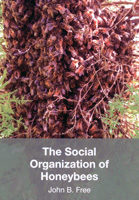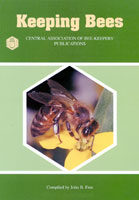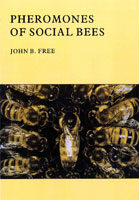Professor John B Free, a world authority on the subject covers the areas of colony organisation, activity, defence, forage collection, and reproduction in a very readable style. Recommended for all taking BBKA Exams.
The honeybee is one of the most intensively studied insects and many of the findings have wide implications and have stimulated research on other organisms. Recent study of the honeybee colony has greatly advanced our knowledge of its organization, and of how the behavioural and physiological repertoires of the individual members of a colony interact, and how the individuals communicate with each other and coordinate their activities, so that the colony functions as a coherent whole. These latest findings, many of which have only previously appeared in scientific journals, have been incorporated into an objective, concise, yet readily readable account of the social organization of the honeybee colony.
Topics discussed include: colony structure and organization, physiological mechanisms of caste determination, the activities and adaptability of worker bees, temperature regulation, reproduction, seasonal cycle of activities, the special part that pheromones play in regulating colony activities, communication of the location of forage, and the principles of foraging behaviour.





